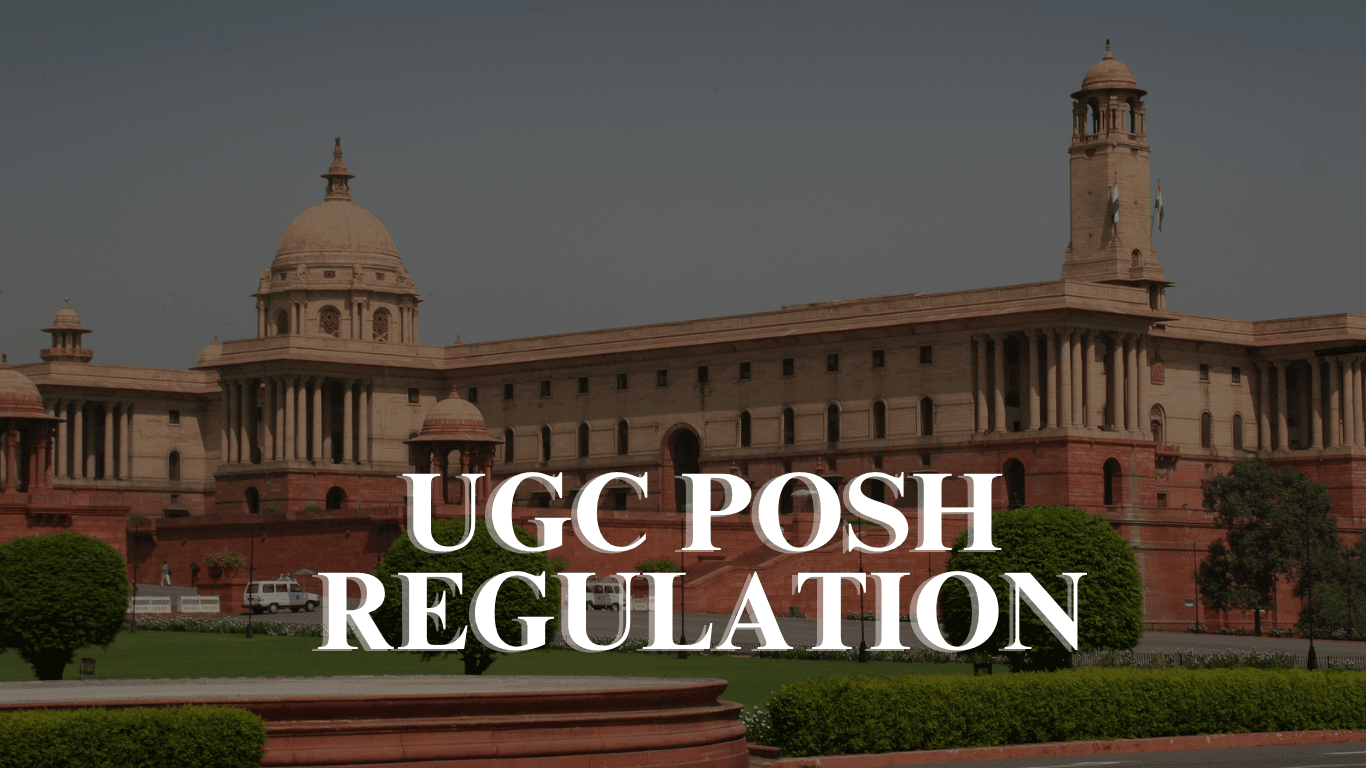Amid growing concerns over suicide cases in reputable higher education institutions, the spotlight is once again on the measures and safeguards that the government and the UGC have put in place to foster a secure and dignified environment for all.
The UGC PoSH Regulation within higher education institutions (HEIs) and its alignment with the Prevention of Sexual Harassment Act (PoSHA) is a transformative legislation. Emphasizing the imperative for secure and respectful educational environments, it navigates through the intricacies of defining sexual harassment and its multifaceted impact.
Introduction:
The Prevention of Sexual Harassment Act in Educational Institutions, also known as PoSHA, came into existence in response to a distressing incident of sexual assault against a courageous social activist at her workplace. Enacted in 2013 after the Vishakha case and guidelines, PoSHA stands as a pillar of protection for women employed in a spectrum of domains, ranging from NGOs and corporate entities to sports organizations and higher education institutes. This legislative mandate extends its reach across all workplaces within the nation, enshrining a commitment to its principles.
The landscape of higher education institutions (HEIs) is one that demands a secure and respectful environment for its occupants. Recent developments have underscored the urgency of safeguarding the well-being of both students and employees within these educational realms (Abida Salim Tadvi v. Union of India). The UGC PoSH Regulation, a forward-looking framework introduced by the UGC, has already set the stage for comprehensive addressing of workplace harassment. Progressing from this groundwork, a significant stride forward emerges from a directive in June 2023, emphasizing the ongoing importance of education and enhancement. Through the establishment of frequent orientation programs, workshops, seminars, and awareness campaigns, this mandate reinforces the commitment to cultivate an environment where all stakeholders are equipped with knowledge, empowered, and actively involved in fostering workplace security. This article embarks on a journey into the dynamic realm of workplace safety within HEIs, with a dedicated lens on the evolving role of the UGC PoSH Regulation.
Defining Sexual Harassment and its Impact:
PoSHA defines sexual harassment as involving “sexual undertones or advances.” Importantly, it is not limited to interactions between individuals of different genders; instead, it encompasses any violation of personal rights, regardless of the genders involved. A recent interpretation clarified that definition of sexual harassment mentioned in section 2(n) of the act need not be confined to a specific gender dynamic, for the infringement of personal rights does not mention that individuals from same gender cannot infringe personal liberty. The Act extends its protection to female students in schools, categorizing them as “aggrieved women.” In 2015, the University Grants Commission (UGC) introduced the UGC PoSH Regulation, a powerful and comprehensive step towards addressing sexual harassment in higher educational institutions (HEIs).
The Gender-Neutral Approach: UGC PoSH Regulation 2015:
Unlike some other legislations that may focus on specific relationships, this regulation takes a gender-neutral approach, offering protection to individuals of all genders, including males and those identifying as the third gender. This gender-inclusive perspective ensures that all members of the educational community are safeguarded from sexual harassment.
The UGC PoSH Regulation advocates a zero-tolerance policy towards sexual harassment, treating it as misconduct under service rules for employees and a disciplinary violation for students.[6] This approach emphasizes the seriousness with which the issue is treated, promoting a safe and respectful environment for everyone within the HEIs.
Promoting a Safe Environment in HEIs:
The UGC PoSH Regulation recognizes that sexual harassment can occur in various scenarios and involves a wide range of perpetrators. It acknowledges that sexual harassment is not limited to a one-way dynamic, such as male-to-female harassment. Instead, it considers that sexual harassment can occur between students, teachers, or even involve individuals from outside the HEI, such as peers from other institutions participating in inter-college events. This comprehensive view ensures that no form of sexual harassment goes unnoticed or unaddressed, fostering a culture of respect and safety within the HEIs.
One of the significant strengths of the UGC PoSH Regulation is its emphasis on the constitution of inclusive Internal Complaints Committees (ICCs). These committees consist of student representatives, faculty members, non-teaching employees, and an independent member from an NGO working for women’s rights.[8] By including diverse perspectives and voices, the ICCs ensure fair and unbiased handling of sexual harassment complaints, creating an environment where survivors feel empowered to come forward. To effectively combat sexual harassment, the prompt establishment of Internal Complaints Committees (ICCs) within organizations is essential. [9] Failure to do so may result in penalties, as also reiterated in a recent judgement by the Madhya Pradesh High Court. The key requisites of an ICC, as mentioned in the regulation, include maintaining a neutral stance, conducting regular mandatory awareness sessions, and being approachable while providing information about its members to the public at large. These practices promote a safe and supportive environment for addressing sexual harassment cases effectively.
The UGC PoSH Regulation also stands against any form of gender discrimination. It explicitly states that concern for the safety of women students should not be used to impose discriminatory rules for women in hostels or restrict their freedom of movement.[11] HEIs are encouraged to take decisive actions[12] against all forms of gender-based violence and discrimination, reinforcing their commitment to ensuring a safe and supportive campus environment.
To further promote safety, the regulation recommends specific measures such as prioritizing the construction of women’s hostels, providing reliable transportation, offering gender-sensitive healthcare, ensuring adequate lighting, and conducting sensitization programs.[13] These initiatives contribute to creating an environment where everyone feels respected, protected, and free from the fear of sexual harassment.
Addressing False Complaints and Reporting:
The UGC PoSH Regulation acknowledges the importance of preventing false and malicious complaints to safeguard the integrity of the process. To address this concern, the regulation includes provisions to deal with such complaints, ensuring that they are not misused to harm innocent individual and publicize the same within all HEIs.[14] This step is crucial in striking a balance between protecting survivors and preventing any misuse of the system.
To maintain transparency and accountability, the UGC PoSH Regulation mandates a consolidated status report on sexual harassment cases annually. However, there have been instances of delayed resolutions, indicating a need for more efficient handling of cases. Recent judgments have emphasized the significance of proper inquiry by Internal Complaints Committees (ICCs) and adherence to POSHA provisions before any termination or punitive actions are taken. These judgments reinforce the need for a fair and impartial investigation process.
Ensuring Compliance and Implementation:
To promote awareness and accountability, institutions are required to publicize their zero-tolerance policy against sexual harassment. This disclosure informs potential employees and students about the institution’s commitment to ensuring a safe environment for all.
The UGC PoSH Regulation enforces compliance with strict penalties for non-compliance. Institutions found not adhering to the regulations risk facing severe consequences, such as withdrawal of grants and affiliations.[17] However, despite the clear provisions, there are challenges in executing the regulations effectively.[18] Some organizations have failed to establish active ICCs, which compromises the intended protection of the regulation. To overcome this, focused efforts are necessary to ensure full adherence and appropriate action against instances of non-compliance.
Conclusion:
The combined efforts of the Prevention of Sexual Harassment Act and the UGC PoSH Regulation are commendable steps towards strengthening workplace safety in educational institutions. The gender-neutral approach and comprehensive provisions ensure that no individual is left unprotected, and all forms of harassment are addressed. The emphasis on forming Internal Complaints Committees and promoting a safe campus environment further reinforces the commitment to creating a respectful and secure atmosphere for everyone.
Despite these positive strides, the challenges lie in effectively implementing these measures. Instances of delayed resolutions and non-compliance are issues that demand our attention for continuous improvement. Awareness campaigns and proactive measures are essential to ensure that institutions take the necessary steps to enforce the regulations fully. Scrutiny by the UGC on the institutions to mandatorily form an active ICC, and regular checkups, remain the need of the hour.
Overall, these legislations provide a strong foundation for combating sexual harassment in higher education, but their success ultimately depends on the collective efforts of educational institutions, regulatory bodies, and the public. Institutes must understand that forming an Internal Complaints Committee is not just about financial investment. It’s about ensuring a safer environment for everyone within the institution. Sexual harassment is a serious issue, and nobody should have to endure it. It is the institute’s responsibility to uphold the trust placed in them by their students and employees, providing a secure and respectful atmosphere. By following the regulations and providing a fair process, the institute not only helps individuals seek justice but also elevates its own standing as an institution committed to protecting the rights and well-being of its members.
Previously published on LinkedIn here.

